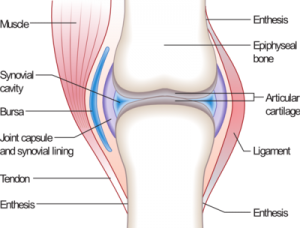Recently while I was doing research on the link between aggrecan and its connection and effect on the cartilage, I came across this study which seems that suggest that by combining the hyaluronic acid with an external source of synovial fluid we can still get chondrogenic differentiation from mesenchymal stem cells in vivo.
 After reading over the abstract a very simple idea came to me and made me wonder whether in vivo cartilage formation would be just easier to perform. If we remember from our research on microfracture surgery on a possible way to increase height, we note that the microfracture surgery was really very simple. You make a hole in the articular cartilage defect region with a awl and the hole will reach the below the initial bone surface to the sub-cortical level and get to the marrow when the MSCs are. The MSCs leak out and that clotting action creates a another cartilage in the defect’s place after about 2-4 months. However that cartilage would be with disorganized fibers known as fibrocartilage.
After reading over the abstract a very simple idea came to me and made me wonder whether in vivo cartilage formation would be just easier to perform. If we remember from our research on microfracture surgery on a possible way to increase height, we note that the microfracture surgery was really very simple. You make a hole in the articular cartilage defect region with a awl and the hole will reach the below the initial bone surface to the sub-cortical level and get to the marrow when the MSCs are. The MSCs leak out and that clotting action creates a another cartilage in the defect’s place after about 2-4 months. However that cartilage would be with disorganized fibers known as fibrocartilage.
This may be one of the easiest proposed ways to increase height yet. The study below shows that if you infuse TGF-beta 1 into a culture of explanted MSCs from the marrow of horse, then the culture will under staining to check for proteoglycan and type 2 collagen see high levels. While the hyaluronic acid by itself does little in terms of anabolic chondrocyte formation, the hyaluronic acid with synovial joint fluid does have some chondrogenic ability. What I propose is a 4 step process for height increase.
- Take X-rays of the individual’s knee region to figure out where exactly their articular cartilage ends and where the synovial joint begins.
- We are targeting the region inside the synovial joint where the hyaluronic acid (as a GAG) and the synovial joint will be.
- We make two incisions on the medial and lateral side of the end of the tibia cutting into the joint, so that the synovial fluid can reach into the inside of the epiphysis.
- We inject TGF-Beta1 into the epiphysis, where it will be mixed with the HA and the SF. Since the fluid will flow into the marrow all three compounds will help the MCSs inside to go through chondrocyte differentiation.
- The way the incision on the bone will be made will be a from the side to give the bone to heal in a certain way that the MSCs produced will create a band of fibrocartilage which will let is easier for the bone to expand longitudinally.
- We make another injection of TGF-beta 1 at a high level, arund 200 ng/ mL into the joint itself to stimulate the chondrogenic property of the HA and SF already in the knee. This will also precent any leaking of MSCS out of the induced incision from diluting the effect of the TGF-Beta1.
The full text for the study is available from clicking the link.
Abstract
Mesenchymalstem cells(MSC) have the potential to differentiate into distinct mesenchymal tissuesincluding cartilage, which suggest these cells as an attractive cell source for cartilage tissue engineering approaches. Our objective was to study the effects of TGF-beta1, hyaluronic acid and synovial fluid on chondrogenic differentiation of equine MSC. For that, bone marrow was aspirated from the tibia of one 18-month-old horse (Haflinger) and MSC were isolated using percoll-density centrifugation. To promote chondrogenesis, MSC were centrifuged to form a micromass and were cultured in a medium containing 10 ng/ml TGF-beta1 or 0.1 mg/ml hyaluronic acid (Hylartil®, Ostenil®) or either 5%,10% or 50% autologous synovial fluid as the chondrogenesis inducing factor. Differentiation along the chondrogenic lineage was documented by type II collagen and proteoglycan expression. MSC induced by TGF-beta1 alone showed the highest proteoglycan expression. Combining TGF-beta1 with hyaluronic acid could not increase the proteoglycan expression. Cultures stimulated by autologous synovial fluid (independent of concentration) and hyaluronic acid demonstrated a pronounced, but lower proteoglycan expression than cultures stimulated by TGF-beta1. The expression of cartilage-specific type II collagen was high and about the same in all stimulated cultures. In summary, hyaluronic acid and autologous synovial fluid induces chondrogenesis of equine mesenchymal stem cells, which encourage tissue engineering applications of MSC in chondral defects, as the natural environment in the joint is favorable for chondrogenic differentiation.
© 2004 Elsevier Ltd. All rights reserved.

can i translate your post and use it in my website please?
Go ahead. just link to the article post and reference it.